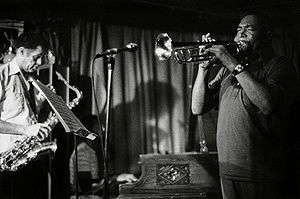Benny Bailey
| Benny Bailey | |
|---|---|
|
Dexter Gordon, left, with Bailey at the Village Vanguard, June 1977 | |
| Background information | |
| Birth name | Ernest Harold Bailey |
| Born |
August 13, 1925 Cleveland, Ohio, United States |
| Died |
April 14, 2005 (aged 79) Amsterdam, Netherlands |
| Genres | Jazz, bebop, hard bop |
| Occupation(s) | Musician, songwriter, record producer |
| Instruments | Trumpet, piano, flute |
| Years active | 1940s–? |
| Labels | Argo, Candid, Concord, MPS, Freedom, Enja, Ego Records, Gemini Records, Jazzcraft Records, TCB Records, Laika Records |
| Associated acts | Bull Moose Jackson, Scatman Crothers, The Kenny Clarke-Francy Boland Big Band, Quincy Jones, Tony Coe, Dizzy Gillespie, Lionel Hampton, Freddie Redd |
Ernest Harold "Benny" Bailey (13 August 1925 – 14 April 2005) was an American bebop and hard-bop jazz trumpeter.[1]
Biography
Bailey was born in Cleveland, Ohio. He had some training in piano and flute in his youth, but switched to trumpet, and concentrated on the instrument while at the Cleveland Institute of Music. He was influenced by his hometown colleague, Tadd Dameron, seven years his elder, and subsequently had a significant influence on other prominent Cleveland musicians including Bill Hardman, Bobby Few, Albert Ayler, Frank Wright and Bob Cunningham. Bailey also played with "Big T" Tony Lovano - Joe Lovano's father.
In the early 1940s he worked with Bull Moose Jackson and Scatman Crothers.[1] He later worked with Dizzy Gillespie and toured with Lionel Hampton.[2] During a European tour with Hampton he decided to stay in Europe and spend time in Sweden. This Swedish period saw him working with Harry Arnold's big band.[1] He tended to prefer big bands over small groups and became associated with several big bands in Europe including the Kenny Clarke/Francy Boland Big Band. Later he began to work with Quincy Jones and that led to a brief return to the United States in 1960. During this time, he was invited to the studio as part of Freddie Redd's sextet to record the Blue Note Records album Redd's Blues after meeting the pianist during a tour in Sweden, where Bailey had been residing at the time. Shortly thereafter, he returned to Europe first to Germany, and later to the Netherlands, where he would settle permanently.
In 1969 he played on Eddie Harris and Les McCann's album Swiss Movement, recorded live at the Montreux Jazz Festival, even though it was not his usual style of music, and including a memorable unrehearsed solo on the Gene McDaniels' song "Compared to What". Then in 1988 he worked with British clarinetist Tony Coe[1] and kept producing albums until 2000 when he was in his mid-70s.
Bailey died at home in Amsterdam on April 14, 2005.[1]
Discography
- Quincy - Here We Come (Metronome, 1959) also released as The Music of Quincy Jones on Argo in 1961
- Big Brass (Candid, 1960)
- Soul Eyes - (MPS 1968)
- Folklore in Swing (MPS, 1966)
- The Balkan in My Soul(MPS, 1968)
- Soul Eyes: Jazz Live at the Domicile Munich (MPS 1968)
- Mirrors (The Amazing Benny Bailey) (arranged & conducted by Francy Boland (Freedom 1971)
- Islands (Enja 1976)
- Serenade to a Planet (Ego 1976)
- East of Isar (Ego 1978) - The Sal Nistico-Benny Bailey Quintet
- Grand Slam (Jazzcraft 1978)
- While My Lady Sleeps (Gemini 1990)
- No Refill (TCB Records1994)
- Angel Eyes (Laika 1995)
- Peruvian Nights (TCB 1996)
- I Thought About You (Laika 1996)
- The Satchmo Legacy (Enja 2000)
- The Rainbow People (Steeplechase 2002)
With Count Basie
- Basie in Sweden (Roulette, 1962)
With the Kenny Clarke/Francy Boland Big Band
- Jazz Is Universal (Atlantic, 1962)
- Handle with Care (Atlantic, 1963)
- Now Hear Our Meanin' (Columbia, 1963 [1965])
- Swing, Waltz, Swing (Philips, 1966)
- Sax No End (SABA, 1967)
- Out of the Folk Bag (Columbia, 1967)
- 17 Men and Their Music (Campi, 1967)
- All Smiles (MPS, 1968)
- Faces (MPS, 1969)
- Latin Kaleidoscope (MPS, 1969)
- Fellini 712 (MPS, 1969)
- All Blues (MPS, 1969)
- More Smiles (MPS, 1969)
- Clarke Boland Big Band en Concert avec Europe 1 (Tréma, 1969 [1992])
- Off Limits (Polydor, 1970)
- November Girl (Black Lion, 1970 [1975]) with Carmen McRae
- Change of Scenes (Verve, 1971) with Stan Getz
With Eric Dolphy
- Berlin Concerts (1961)
With Stan Getz
- Imported from Europe (Verve, 1958)
With Dizzy Gillespie
- The Complete RCA Victor Recordings (Bluebird, 1937-1949, [1995])
With Benny Golson
- Stockholm Sojourn (Prestige, 1964)
With Dexter Gordon
- Sophisticated Giant (Columbia, 1977)
With Quincy Jones
- Quincy's Home Again (Metronome, 1958) - also released as Harry Arnold + Big Band + Quincy Jones = Jazz! (EmArcy)
- I Dig Dancers (Mercury, 1960)
With Freddie Redd
- Redd's Blues (Blue Note, 1961)
With Sahib Shihab
- Companionship (Vogue Schallplatten, 1964-70 [1971])
With Randy Weston
- Uhuru Afrika (Roulette, 1960)
With Jimmy Witherspoon
- Some of My Best Friends Are the Blues (Prestige, 1964)
With Phil Woods
- Rights of Swing (Candid, 1961)
See also
- Vocalese, an album by Manhattan Transfer with a tribute song
References
- 1 2 3 4 5 "Benny Bailey - Obituary". The Telegraph. 11 May 2005. Retrieved 23 December 2010.
- ↑ Cook, Richard (2005). Richard Cook's Jazz Encyclopedia. London: Penguin Books. pp. 27–28. ISBN 0-141-00646-3.
